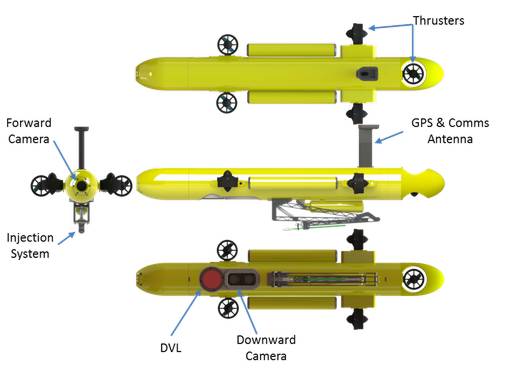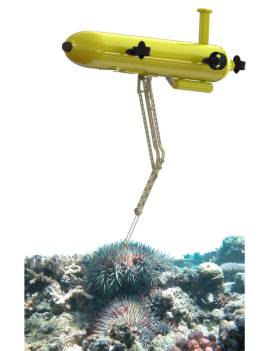| Robot Killer To Defend Great Barrier Reef |
| Written by Lucy Black | |||
| Saturday, 05 September 2015 | |||
|
Researchers in Australia have developed a robot submarine that can identify the crown of thorn sea stars that destroy coral reefs and deliver a lethal injection. The world's coral reefs are dying. There are many contributory factors including overfishing, pollution, damage from careless scuba divers and climate change. According to Queensland University of Technology, however, it is the crown of thorns starfish (Acanthaster planci) that is responsible for 50 per cent of the Great Barrier Reef's total decline in coral cover. To combat this problem, researchers at QUT are now trialling COTSbot, an autonomous underwater vehicle equipped with a vision system that recognizes the predatory sea stars (COTSS) and delivers poison via a robotic arm. A single shot of poison kills a COTSS in 24 hours but as it is harmless to everything else on the reef it doesn't matter if a single COTSS is injected repeatedly.
The COTSbot is 30-kilogram robotic yellow submarine designed to operate without a tether and execute missions with minimal human interaction once deployed. It is equipped with stereoscopic cameras to give it depth perception, five thrusters to maintain stability, GPS and pitch-and-roll sensors and a unique pneumatic injection arm to deliver the poison. Its computer vision and machine learning system is based on six months of training the robot to recognise COTS among coral, using thousands of still images of the reef and videos taken by COTS-eradicating divers. According to Dr Feras Dayoub from QUT's Science and Engineering Faculty and Australian Centre for Robotic Vision, who designed the COTS-detecting software, the robot will continue to learn from its experiences in the field: "If the robot is unsure that something is actually a COTS, it takes a photo of the object to be later verified by a human, and that human feedback is incorporated into the robot's memory bank." This video shows its detection system in action:
COTSbot's creator, Dr Matthew Dunbabin from QUT's Institute for Future Environments, said "Human divers are doing an incredible job of eradicating this starfish from targeted sites but there just aren't enough divers to cover all the COTS hotspots across the Great Barrier Reef. We see the COTSbot as a first responder for ongoing eradication programs - deployed to eliminate the bulk of COTS in any area, with divers following a few days later to hit the remaining COTS. The COTSbot becomes a real force multiplier for the eradication process the more of them you deploy - imagine how much ground the programs could cover with a fleet of 10 or 100 COTSbots at their disposal, robots that can work day and night and in any weather condition."
This is an excellent example of giving robots a task that, as well as being tedious and time consuming, would otherwise be too expensive, or potentially dangerous for humans to do. However having a robot kill something living is still a little disturbing to some given the recent call to ban autonomous weapons.
More InformationNew robot has crown-of-thorns starfish in its sights Related ArticlesAI Researchers Call For Ban On Autonomous Weapons Halting Problem Used To Prove A Robot Cannot Computably Kill A Human To be informed about new articles on I Programmer subscribe to the RSS feed, follow us on, Twitter, Facebook, Google+ or Linkedin, or sign up for our weekly newsletter.
Comments
or email your comment to: comments@i-programmer.info |
|||
| Last Updated ( Saturday, 05 September 2015 ) |



